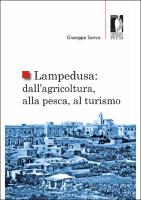Lampedusa: dall’agricoltura, alla pesca, al turismo
Abstract
In September 1843, about a hundred Sicilian farmers arrived to the island of Lampedusa with the King of the Two Sicilies’s promise of a plot of land to cultivate, a house and a government subsidy of 4 tarì per day (about 20 euros today). The difficult environmental conditions, however, made the practice of agriculture almost impossible, and led the first settlers to a life of sacrifice and hardship. Later, sponge diving and fishing allowed the Lampedusa community to free itself from the hard life in the fields, and to achieve at least some economic security. Tourism, which began tentatively in the late 1960s, ensured the people even greater well-being. All this, combined with the innate willingness of the people from Lampedusa to welcome tourists, are mentioned in the book. Fabio Giovanetti and Antonino Taranto contributed to the volume’s realization, enriching it with important historical documents as well as images, and collaborated in the revision of the text. Their deep knowledge of the naturalistic, historical and landscape aspects of Lampedusa have been fundamental.


 Download
Download Web Shop
Web Shop